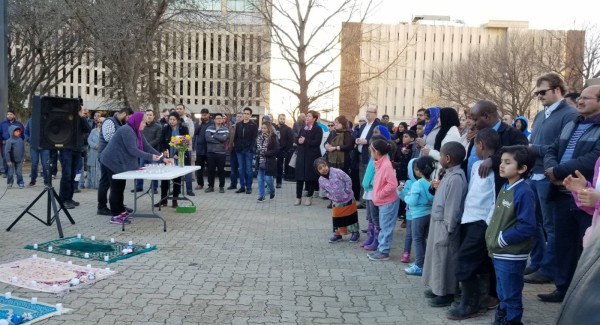Will the labour movement lead the charge for a just transition in Sask?

Unifor Local 594 represents over 800 workers at Regina’s Co-op Refinery Complex. The complex processes up to 130,000 barrels of crude oil every day. Photo by Eagleclaw Bunnie
“It’s tough not to get into arguments about [Just Transition], regardless of how you talk about it,” Mike Day, the president of United Steelworkers (USW) Local 5890, tells me. USW 5890 represents the steelworkers at the Regina plant operated by EVRAZ North America, whose focus is making pipelines for projects like the Trans Mountain expansion. “We take it as an attack on our jobs,” Day explains.
The conversation around a just transition – the need to immediately shift to renewable energy, in a way that’s fair for Indigenous peoples and workers – is fairly new in Saskatchewan. But it has big implications in a province that relies heavily on non-renewable resource extraction when, historically, it’s been labour unions like the Steelworkers that have led just transition conversations elsewhere.
In January of 2019, one in every 25 workers in Saskatchewan was employed in “forestry, fishing, mining, quarrying, and oil and gas,” according to Statistics Canada. And unions represent a significant number of people working in non-renewable energy in the province – Saskatchewan has a unionization rate of around 30 per cent. For example, workers for the Crown corporations SaskEnergy, the province’s main supplier of natural gas, and SaskPower, the province’s principal electric utility, are unionized with Unifor Local 649.
A just transition in the province won’t happen unless labour unions are on board. A central pillar of a just transition is making sure that all new green jobs are unionized and public – if not administered under community-owned or co-operative models – ensuring fair wages and workers’ rights. Additionally, a true just transition incorporates both justice for Indigenous peoples and decolonization – returning stolen lands.
So how are Saskatchewan unions and their locals engaging in the growing conversation around a just transition?
The Just Transitions Summit
On October 27 and 28, 2018, a Just Transitions Summit was hosted in Regina to bring environmental activists, union members, and the general public together to discuss and further define a just transition in Saskatchewan.
“The whole concept of just transition comes from the labour movement,” explains Emily Eaton, an associate professor of geography at the University of Regina and one of the event’s organizers. “The labour movement has been driving the concept and it focuses on not leaving labour unions behind.”
Speakers at the summit included environmental activists, politicians, and union members. Unifor sent two national representatives, Sari Sairanen and Ken Bondy. CUPW sent a national organizer, James Hutt. While local union members were in attendance, Barb Cape, president of SEIU West, was the only local labour leader who spoke as a panelist.
A central pillar of a just transition is making sure that all new green jobs are unionized and public – if not administered under community-owned or co-operative models – ensuring fair wages and workers’ rights.
“Unifor has been working at the forefront of just transition,” says Eaton. In October 2018, Unifor sponsored Alberta’s third annual Just Transitions and Good Jobs Conference, hosted by Blue Green Canada. They’ve focused on fairness for workers impacted by the phasing out of coal, applauding the federal government’s formation of the Task Force on Just Transition for Canadian Coal Power Workers in 2018. They’ve also lobbied the federal government for an explicit commitment to a just transition – and “good, green job creation” – to be included in Canada’s climate policy.
“Unfortunately, the locals in Saskatchewan are not on the same page as their leadership,” Eaton continues. “It was really important to me to have Unifor there because of the workers at the refinery,” she adds, referring to Unifor Local 594, which represents over 800 workers at Regina’s Co-op Refinery Complex. The complex processes up to 130,000 barrels of crude oil every day.
Ian Boyko, communications representative for Unifor, tells me, “We were invited to provide a speaker on a panel about the work we’re doing across the country on just transitions” – and because the focus of the panel was national, Unifor sent a national representative instead of a local representative.
Other local union leaders who were not in attendance give a variety of reasons as to why they were unable to participate. The summit took place right as the Saskatchewan Federation of Labour annual convention was ending, and the SFL’s president, Lori Johb, says local SFL staff and elected officials were still tied up with convention tasks. Johb also mentions that the SFL wasn’t involved in planning the summit and didn’t receive notice of the event until shortly before it happened. Day tells me that USW Local 5890 wasn’t invited at all.
“Unfortunately, the locals in Saskatchewan are not on the same page as their leadership.”
“There is no doubt that more time to plan and invite all the different organizations and constituencies in Saskatchewan, including labour unions, would have been advantageous,” Eaton says. “The very few people involved organized the events in their free time with no staff support. We tried to the best of our ability to reach out to as many different unions as possible as soon in the process as possible. We hope that with more lead time, the SFL will engage with us in the future to make sure that no affiliate is left out.”
“People get defensive”
“I think people locally are fearful about speaking about this,” says Eaton. “These conversations are new to Saskatchewan.”
“[Climate change] affects every aspect of our lives but I think collectively people bury their heads in the sand because it’s just so overwhelming,” Cape asserts.
Furthermore, if the push toward a just transition appears to come from outside the labour movement, it’s not necessarily well received by unions.
“When you hear the words ‘just transition,’ people get defensive,” says Day. “This is coming from people outside the industry. People who are into renewables need to think about inviting those in the industry to be involved in the conversation.”
In June, Day stood beside Ryan Meili, leader of Saskatchewan’s NDP, outside the EVRAZ steel plant as Meili called for a pipeline expiry date system to be implemented in the province. It was a proposal designed to be a crowd pleaser – increased employment for steelworkers, who would manufacture the new pipes, and better environmental protections against old, leaky infrastructure.
However, the Saskatchewan Party all but laughed in Meili’s face, calling the proposal “irrational” and expensive. While the Sask Party is opposed to even fiddling with the status quo, what we need is transformative system change, like a green jobs guarantee – a hallmark of Green New Deal proposals – which would fund retraining and employ all non-renewable energy workers in low-carbon jobs. There are already people, like those in the Courage coalition, pushing for the federal NDP to run on a Green New Deal in 2019.
“[Climate change] affects every aspect of our lives but I think collectively people bury their heads in the sand because it’s just so overwhelming.”
It might sound like a leap for steelworkers to go from campaigning for new pipelines to backing a Green New Deal. But it was the United Steelworkers that, in 2008, joined forces with environmental organization Environmental Defence to found Blue Green Canada, a collaboration of labour unions and environmental groups that advocates for green jobs.
More recently, the Steelworkers have been advocating for a just transition at the national level. Mark Rowlinson, executive assistant to the Canadian national director of the USW and president of Blue Green Canada, was part of the federal government’s Task Force on Just Transition for Canadian Coal Power Workers. And a USW delegation took part in the 2015 United Nations Climate Change Conference in Paris. But their efforts have largely been confined to working with governments and international bodies which are using the language of a “just transition” to make minor reformist change – not building a social movement that can push for a transformative shift to a decarbonized economy or prioritize justice for Indigenous peoples.
Part of the problem, according to Cape, is a disconnect within the labour movement. “The locals are not aware of what national unions are doing,” she says.
Day says that although there have been formal conversations in other parts of USW District 3 (which encompasses British Columbia, Alberta, Saskatchewan, Manitoba, Yukon Territory, the Northwest Territories, and Nunavut) about a just transition, the conversations so far at USW Local 5890 have been informal.
“We’ve had the conversations about just transition and what is ‘just’ and what are we transitioning to and it’s the same thing, no one understands,” says Day. “We have members with a Grade 12 education who are going to start losing their jobs. What’s the just transition going to do for that?”
But their efforts have largely been confined to working with governments and international bodies which are using the language of a “just transition” to make minor reformist change.
According to Boyko, though, there is no disconnect. “It’s not like just transition is happening at 30,000 feet and that’s where all the work is going on,” he says. “It’s happening at the local level. That’s where the work is happening.”
Although Boyko claims that “locals are involved at every step of the process,” he is unable to articulate the process for discussing a just transition at Unifor.
Cape thinks the lack of clarity about just transition contributes to the difficulty in having conversations about it.
“[Just transition] is controversial because it threatens status quo,” Cape says. “Without a clear understanding, people fill in that void.”
Another challenge to discussing this concept is a lack of agreement about the future of energy in Saskatchewan.
“I think things are changing in Saskatchewan,” Eaton says. “I think there’s a recognition that we can’t go on burning coal forever and using fossil fuels forever.”
But Day disagrees. “There’s a huge push on [renewable energy],” he says. “I don’t think renewable energy is the answer for everything. We’re never going to get rid of oil. It’s not going to be one or the other.”
Despite clear disagreements among key potential partners in the conversation, there is an agreement that further discussions and plans need to start happening in a bigger way.
“Our main focus is on the workers and that they’re treated fairly and that they’re getting the opportunity to participate in a just transition,” Johb says. “And it needs to start.”
Johb gives an example of why this is important. While there is a new geothermal power plant being constructed near Estevan, the company leading the project is a privately held corporation.
“When we talk about the geothermal power plant, why would we contract that out?” she asks. “Why wouldn’t SaskPower do it? I feel that opportunities are being missed. [The government] isn’t thinking about the workers when they’re having these conversations.”
“They don’t speak the same language”
“I’m hoping that in future years, it’ll be more locally based representatives that are speakers [at the Just Transitions Summit],” says Eaton. “It matters that they are local because it is their locals that have more influence in the province. If climate change policy is to be enacted on a community and provincial scale, it is local workers that will be impacted and that need to lead the way in establishing what kinds of green jobs and economies would work given the local conditions.”
Cape suggests that roundtable discussions about just transition should happen with local leaders from resource-extraction unions, local leaders from other areas of the labour movement, and local environmental activists. “If we can’t have those conversations, then we don’t actually have a partnership,” she said.
“If climate change policy is to be enacted on a community and provincial scale, it is local workers that will be impacted and that need to lead the way in establishing what kinds of green jobs and economies would work given the local conditions.”
However, bringing unions and environmentalists together to forge a path forward will likely be a challenging process.
“The labour movements and activists don’t speak the same language and don’t understand each other’s issues,” Cape asserts. “This acts as an irritant to true partnership because they don’t feel understood or heard. I see that on both sides – within the environmental movement and within the labour movement.”
Eaton echoed her sentiments. “I’m not necessarily the right person to build those bridges but I’m interested in helping,” she says. “I think it needs to come from the labour movement itself and be supported from outside. Without a plan for a post-carbon economy, Saskatchewan workers will be hit hard and will be left without supports and to fend for themselves individually in labour markets.”
Time to engage
A resolution that passed at the most recent SFL convention in October 2018 attempts to address the lack of a clear just transition process with the following plan: “The SFL will: protect the interests of workers, their families, and communities across Saskatchewan by advocating for fair and holistic just transition plans from the provincial and federal governments, so that no worker is left behind in a changing economy and in a changing climate.”
Eaton’s vision of the process differs by encouraging unions to take the lead in defining transition plans.
“The work of just transition is coming together and forming a strategic plan about the future of work in the province and making demands from government about the types of supports that are needed for this transition,” Eaton affirms. “If fossil fuels are phased out over the next 15 years, what will the workers at the refinery and the steel plant do? If unions begin to engage now, they can shape the future of work in a post-carbon economy. They can advocate for green industries that will make good use of their members’ skills, for example.”
As the privatized contract for the new geothermal power plant demonstrates, it’s past time for serious planning in Saskatchewan toward a just transition. The question remains: will unions take the lead before it’s too late – and which union will lead the charge?




